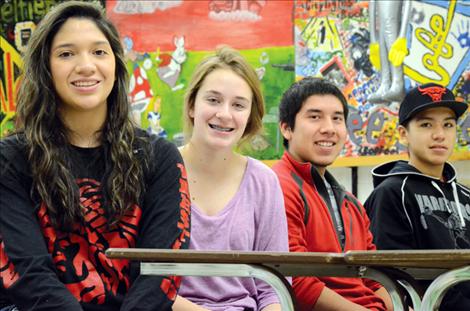Students challenge reservation stereotypes
Hey savvy news reader! Thanks for choosing local.
You are now reading
1 of 3 free articles.
ARLEE — People living on the reservation sometimes hear strange things about what life is like on land designated as tribal ground. Arlee High School students say they’ve heard it all.
“I’ve heard people say they think we live in teepees and lack technology,” Zach Felsman, 18, said.
Zach sometimes hears “go back to the rez” at football games.
“It’s not too heated but it’s annoying,” he said “They usually say the same old stuff.”
Many of the labels have to do with appearance.
“I’ve heard we are tall and skinny and shoot arrows all the time,” said Naomi Plant, 15.
PJ Haynes, 17, says there is an underlying problem with these labels.
“People don’t look at you the way we really are,” he said. “You can be a good person but they only look at you with how they think you are.”
Arlee teacher Anna Baldwin decided that those stereotypes need to change. She put up a flyer a few years ago asking if students wanted to start a group and travel to different schools to talk about what it’s really like to live on the reservation.
“I saw a need for relationship building with other schools,” she said. “Creating relationships and dispelling stereotypes go together: relationships allow us to change. And I thought this would be so good for off-reservation kids and it was good for our kids, too: they feel the stereotypes. Even non-Indian kids feel it.”
Baldwin is a non-Indian teacher. She has taught in Arlee for 11 years and picked up numerous teaching awards. She has also taught in Pablo. Her doctoral research was in professional development and Indian Education for All.
“Indian Education for All became law the year I became a teacher,” she said. “I’ve always been interested in learning how teachers are prepared for it.”
Twenty-six students signed up for the group. Zach was one of the first. The group has traveled to six different schools in the past few years to talk to 225 students in small groups.
“No big speeches,” Baldwin said. “We keep the groups small so kids feel more comfortable talking.”
Abby Yocum, 15, is one of the non-Indian students in the group. She joined the group to help show the cultural diversity that exists on the reservation. Abby said she was surprised by how many people assumed a person living on the reservation was Indian. Baldwin said the multicultural diversity of the group is important.
“The kids represent the diversity we have on the reservation,” she said.
The group recently traveled to a school in Kalispell. Baldwin emphatically explained to the Kalispell students that they were sharing what they have heard about reservation life.
“Some of the kids said they didn’t want to share because they didn’t want to feel like a racist,” she said. “I wanted them to understand that this wasn’t their opinion. It was what they had heard. That makes it a little easier to share.”
Many of the students opened up in the small groups and wrote the things they’d heard on a large sheet of poster paper. Some of the labels about Indians included: savages, drunks, greedy, spiritually inclined, smoke tobacco, ride horses and gamble a lot.
“We’ve all heard it before,” Baldwin said. “These are some really hard things to talk about but that is how you change it. And the fact is our kids live this.”
Baldwin said some of the comments the students hear are not racist.
“Some people are just not informed,” she said. “Are they racist? Are they the same thing? Not always. But how do you keep yourself from seeming racist: you get informed.”
Baldwin structures school visits towards the age group of the students they are visiting.
“It’s different everywhere we go,” she said. “With some of the younger groups, we just share and answer questions.”
During the Kalispell trip, the students led a question and answer session after they identified the labels. Zach said he often explains that people on the reservation do have electricity.
“I hope we’ve helped change people’s perspectives about the reservation and how people act here,” Naomi said. “This is about bringing people together. We can’t face the future when we are all looking at the past.”
















